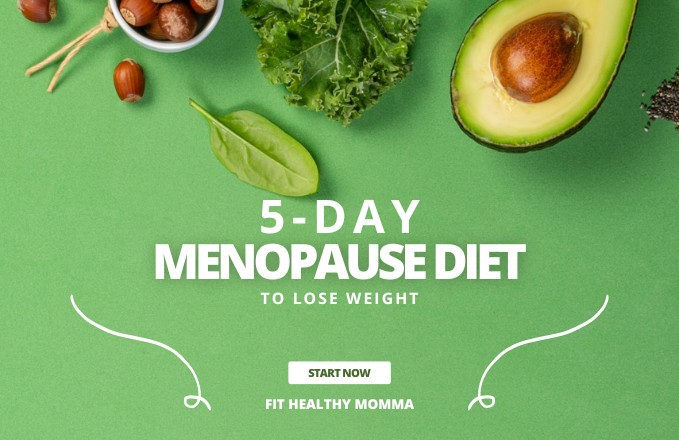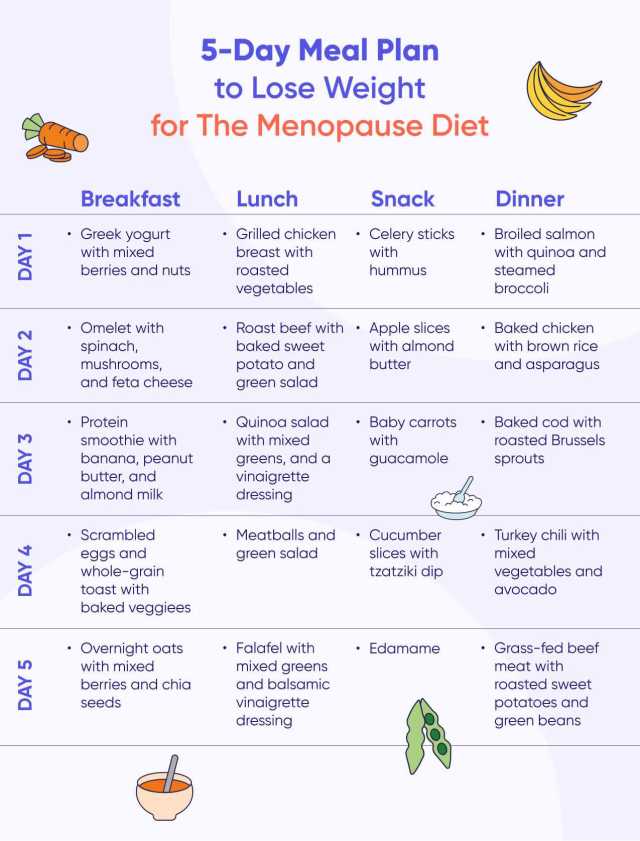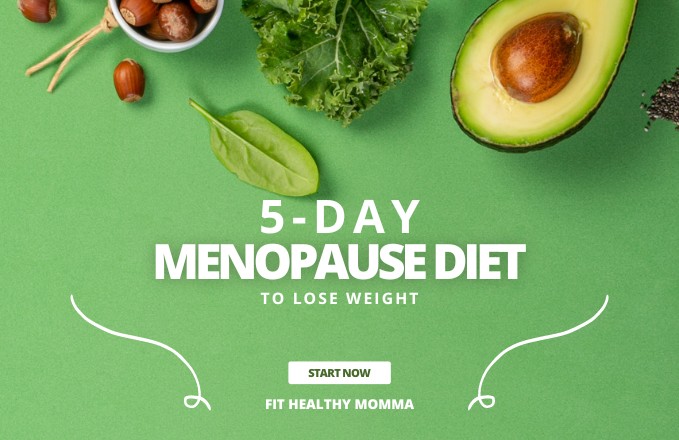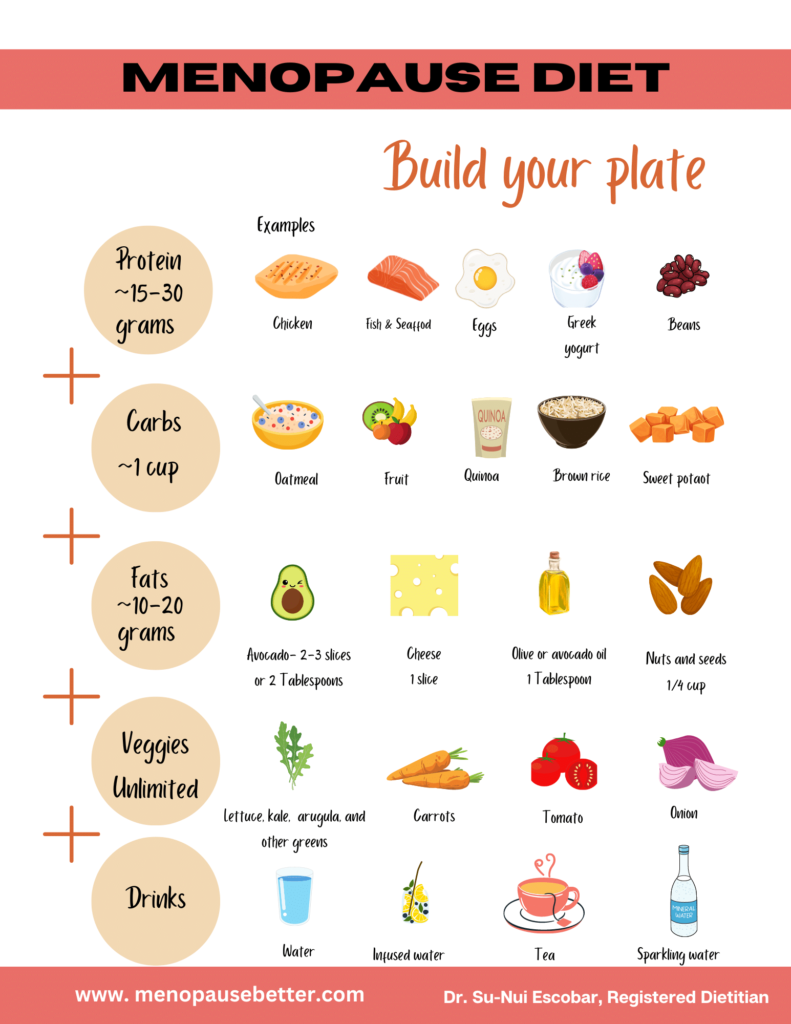
Are you going through menopause and struggling with weight gain? Look no further! The Menopause Diet is here to help you achieve effective weight loss in just 5 days. With a simple and practical plan tailored specifically for menopausal women, this diet will guide you towards your weight loss goals while addressing hormonal changes that can make it challenging to shed those extra pounds. Say goodbye to frustration and hello to a healthier, happier you with The Menopause Diet.

This image is property of i0.wp.com.
Scientists Discover A Hidden Root Cause Of Stubborn Belly Fat, And It Will Surprise You…
Day 1: Understanding Menopause and Weight Gain
The Connection between Menopause and Weight Gain
Menopause is a natural stage of life that all women experience as they reach middle age. It is marked by the cessation of menstrual periods and is often accompanied by a variety of symptoms, including hot flashes, mood swings, and weight gain. Many women notice a significant increase in weight and find it difficult to shed those extra pounds. But what is the connection between menopause and weight gain?
The hormonal changes that occur during menopause are largely to blame for the weight gain that many women experience. As estrogen levels decline, the body begins to store more fat, particularly around the abdomen. This shift in fat distribution can lead to an increase in weight and a higher risk of developing certain health conditions, such as heart disease and diabetes.
Hormonal Changes and Weight Gain during Menopause
During menopause, the ovaries produce less estrogen, which can affect how the body regulates weight. Estrogen plays a role in metabolism, appetite control, and fat distribution, so when its levels decrease, these processes can be disrupted. This hormonal imbalance can lead to slower metabolism, increased appetite, and a greater tendency to store fat.
Not only does the decline in estrogen contribute to weight gain, but other hormonal changes during menopause can also play a role. For example, the levels of progesterone, another hormone, also decrease during menopause. This decrease can lead to water retention and bloating, which can make you feel like you’ve gained weight even though it may not be fat gain.
Factors Contributing to Weight Gain during Menopause
While hormonal changes are a primary factor in menopause-related weight gain, there are other contributing factors to consider. One important factor is age-related muscle loss, known as sarcopenia. As women age, they naturally lose muscle mass, which can slow down metabolism and decrease calorie burning.
Lifestyle factors also play a significant role in weight gain during menopause. Factors such as a sedentary lifestyle, poor diet, and stress can all contribute to weight gain. Additionally, genetic factors may make some women more prone to gaining weight during menopause.
Understanding these factors and their impact on weight gain during menopause is essential for developing effective strategies for weight loss. By addressing the hormonal changes, factors, and their influence on weight gain, you can take proactive steps towards managing your weight effectively during this stage of life.
Day 2: The Role of Nutrition in Menopause Weight Loss
Importance of a Balanced Diet during Menopause
Nutrition plays a crucial role in achieving weight loss during menopause. A balanced diet is essential to ensure that you are getting the necessary nutrients while also enabling your body to burn excess fat. A balanced diet during menopause should be rich in fruits, vegetables, whole grains, lean proteins, and healthy fats.
By focusing on nutrient-dense foods, you can provide your body with the essential vitamins, minerals, and antioxidants it needs to support overall health and well-being. These foods also tend to be lower in calories, which can help create a calorie deficit necessary for weight loss.
Key Nutrients for Weight Loss during Menopause
Certain nutrients are particularly important for supporting weight loss during menopause. Calcium is essential for maintaining bone health and can also aid in weight loss by reducing fat absorption. Foods rich in calcium include dairy products, leafy green vegetables, and fortified plant-based milk alternatives.
Another important nutrient is fiber. Fiber helps promote feelings of fullness and can aid in weight loss by reducing overall calorie intake. It also plays a role in regulating blood sugar levels and supporting digestive health. High-fiber foods include whole grains, fruits, vegetables, and legumes.
Protein is another key nutrient for menopausal weight loss. It can help preserve lean muscle mass, which is important for maintaining a healthy metabolism. Good sources of lean protein include poultry, fish, tofu, Greek yogurt, and legumes.
Recommended Daily Caloric Intake for Menopausal Women
Determining the appropriate caloric intake during menopause is essential for weight loss. While individual calorie needs can vary depending on factors such as age, activity level, and metabolism, there are general guidelines to follow.
On average, menopausal women may require around 1,800 to 2,200 calories per day to maintain their weight. To lose weight, a calorie deficit of around 500 to 700 calories per day is recommended. This deficit can be achieved through a combination of dietary changes and increased physical activity.
It is important to consult with a healthcare professional or registered dietitian to determine the appropriate caloric intake for your specific needs and goals. They can help you develop a personalized meal plan that meets your nutritional needs while promoting weight loss during menopause.

This image is property of www.fithealthymomma.com.
The Secret For Healthy Weight Loss…Click Here…
Day 3: Creating a Healthy Meal Plan for Menopause Weight Loss
Understanding Portion Sizes and Meal Frequency
When creating a healthy meal plan for menopause weight loss, understanding portion sizes and meal frequency is crucial. It is important to strike a balance between satisfying hunger and consuming an appropriate number of calories.
Aim to include three well-balanced meals and two to three snacks throughout the day. This approach can help prevent overeating and keep energy levels stable. When selecting portion sizes, use visual cues such as a deck of cards for protein, a fist for carbohydrates, and a thumb for fats. This can help provide a general guideline for portion control.
Choosing the Right Foods for Menopause Weight Loss
When selecting foods for your menopause weight loss meal plan, focus on nutrient-dense options that are low in calories but high in essential vitamins and minerals. Include a variety of fruits, vegetables, whole grains, lean proteins, and healthy fats to ensure you are getting the necessary nutrients.
Fruits and vegetables are excellent choices as they are low in calories and high in fiber, vitamins, and antioxidants. Whole grains such as brown rice, quinoa, and whole wheat bread provide complex carbohydrates and fiber for sustained energy.
Lean proteins like chicken, fish, tofu, and beans can help promote satiety and preserve muscle mass. Healthy fats from sources like avocado, nuts, and olive oil are important for hormonal balance and overall health.
Sample Menu for a Day of Menopause Weight Loss
Here is a sample menu that incorporates the principles of a healthy meal plan for menopause weight loss:
- Breakfast: Scrambled eggs with spinach and tomatoes, whole wheat toast, and a side of berries.
- Snack: Greek yogurt with a sprinkle of nuts and berries.
- Lunch: Grilled chicken salad with mixed greens, cucumbers, cherry tomatoes, and a vinaigrette dressing.
- Snack: Carrot sticks with hummus.
- Dinner: Baked salmon with roasted vegetables and a small serving of quinoa.
- Snack: Apple slices with almond butter.
Remember to adjust portion sizes and calorie intake based on your individual needs and consult with a healthcare professional or registered dietitian for personalized guidance.
Day 4: Incorporating Exercise into Your Menopause Weight Loss Plan
Benefits of Exercise during Menopause
Incorporating exercise into your menopause weight loss plan offers numerous benefits beyond helping you shed unwanted pounds. Regular physical activity can improve cardiovascular health, boost mood, increase bone density, and improve overall strength and flexibility.
Exercise has also been shown to help manage symptoms commonly associated with menopause, such as hot flashes, mood swings, and sleep disturbances. Additionally, exercise can help preserve lean muscle mass, which is important for maintaining a healthy metabolism and preventing age-related muscle loss.
Types of Exercise for Menopause Weight Loss
A well-rounded exercise routine for menopause weight loss should include a combination of cardiovascular exercise, strength training, and flexibility exercises. Cardiovascular exercise, such as brisk walking, running, swimming, or cycling, helps burn calories and improve heart health.
Strength training exercises, such as weightlifting or bodyweight exercises, are essential for preserving lean muscle mass and boosting metabolism. These exercises can also help improve bone density, reducing the risk of fractures and osteoporosis.
Flexibility exercises, such as yoga or stretching, can help improve joint mobility and prevent injuries. They also promote relaxation and can help manage stress, which is important for weight loss during menopause.
Creating an Exercise Routine for Menopause Weight Loss
When creating an exercise routine for menopause weight loss, it is important to find activities that you enjoy and that fit into your lifestyle. Aim for at least 150 minutes of moderate-intensity aerobic exercise or 75 minutes of vigorous-intensity exercise per week.
Start gradually and gradually increase the duration and intensity of your workouts to avoid overexertion. Consider incorporating activities such as walking, swimming, yoga, strength training, or dance classes into your routine. Varying your exercises can help prevent boredom and keep you motivated.
Remember to listen to your body and make adjustments as needed. If you have any pre-existing medical conditions or concerns, consult with your healthcare provider before starting a new exercise program.

This image is property of menopausebetter.com.
Day 5: Additional Strategies for Successful Menopause Weight Loss
Managing Stress and Sleep for Weight Loss during Menopause
Managing stress and ensuring adequate sleep are essential components of a successful menopause weight loss plan. Chronic stress can lead to hormonal imbalances and increased appetite, making it difficult to lose weight. Finding effective stress management techniques, such as meditation, deep breathing exercises, or engaging in hobbies, can help reduce stress levels.
Quality sleep is also crucial for weight loss during menopause. Lack of sleep can disrupt hormone levels and increase cravings for unhealthy foods. Aim for 7-9 hours of quality sleep per night by practicing good sleep hygiene, such as establishing a regular sleep schedule, creating a relaxing bedtime routine, and creating a comfortable sleep environment.
Importance of Hydration and Water Intake
Hydration is often overlooked but plays a significant role in weight loss and overall health during menopause. Adequate water intake can help regulate appetite, promote proper digestion, and prevent overeating. Drinking water before meals can also help increase feelings of fullness, leading to reduced calorie intake.
Make it a habit to drink plenty of water throughout the day, aiming for at least eight glasses per day. You can also include hydrating foods such as fruits and vegetables, which have high water content, in your diet.
Seeking Support and Accountability for Menopause Weight Loss
Lastly, seeking support and accountability can greatly increase your chances of success in your menopause weight loss journey. Inform your friends and family about your goals, or consider joining a support group or finding a workout buddy.
Having someone to share your challenges, successes, and progress with can provide motivation, encouragement, and accountability. You can also consult with a registered dietitian or nutritionist who specializes in menopause for personalized guidance and support.
Conclusion
Losing weight during menopause is not always easy, but it is possible with the right approach. By understanding the connection between menopause and weight gain, focusing on nutrition, incorporating exercise, and implementing additional strategies, you can achieve successful weight loss during this stage of life.
Remember to listen to your body, make gradual lifestyle changes, and consult with healthcare professionals for personalized guidance. With determination, support, and a healthy mindset, you can navigate through menopause with confidence and achieve your weight loss goals.
The Most Potent, Fast-Acting Formula For Incinerating Stubborn Fat
